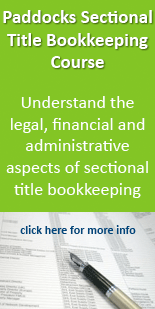By Clint Riddin
 For those readers who do not understand Afrikaans, the word “gaap” means to yawn, and since some people believe accounting is boring, the reference to GAAP seemed appropriate. Why anyone would find this topic boring, however, is beyond me. The thrill of balancing is an indescribable high.
For those readers who do not understand Afrikaans, the word “gaap” means to yawn, and since some people believe accounting is boring, the reference to GAAP seemed appropriate. Why anyone would find this topic boring, however, is beyond me. The thrill of balancing is an indescribable high.For some time now, South Africa has been aligning itself with the International Financial Reporting Standards (IFRS), which means we will soon stop using and referencing Generally Accepted Accounting Practice (GAAP).
 Full IFRS compliance is very onerous and costly, and is not an appropriate accounting standard in many instances for many types of business, such as sole traders, partnerships and others. This argument can also extend to bodies corporate and home owners’ associations.
Full IFRS compliance is very onerous and costly, and is not an appropriate accounting standard in many instances for many types of business, such as sole traders, partnerships and others. This argument can also extend to bodies corporate and home owners’ associations.For some time, South Africa used an accounting standard that was referred to as GAAP for SMEs to give smaller entities an alternative, and it was this standard that seemed to be the best fit for bodies corporate. In August 2009, South Africa adopted IFRS for SMEs, which is similar in many ways to GAAP for SMEs and has now scrapped the local standard.
We refer to IFRS for SMEs as the “best fit” for sectional title as full IFRS compliance is seemingly not necessary, but governance and reporting aspects are key in scheme management and so a good reporting standard is necessary. However, in our view, some accounting aspects in sectional title are not applicable and so there is a need to deviate from IFRS for SMEs.
One such standard is the treatment of fixed assets and depreciation; as a body corporate is not a trading entity, and given that the tax aspects and treatment are very different, there is no need to depreciate assets. So, the full cost should be expensed when any asset is acquired or built. There are exceptions to this suggested treatment, such as fixed property.
PMR 37(1) of the Sectional Tiles Act still refers to financial statements being prepared in accordance with generally accepted accounting practice; given that this standard has been replaced with IFRS, it could be argued that all bodies corporate should have financial statements prepared in compliance with full IFRS, at great expense.
Perhaps this aspect should be amended to at the very least IFRS for SMEs. But a better consideration may be to revisit the needs of users of sectional title financial information and adopt a more meaningful reporting standard that is appropriate and informative. Another reporting standard is possible provided that the basis on which the financial statements have been prepared has been set out clearly.
Consideration should be given to aspects such as compliance with rules, proper determination of levies, and compliance with any section 39(1) restrictions or directions which may have been given to trustees by members in general meeting. Treatment of assets and what constitutes an asset should also be defined. These are just a few of the possible inclusions to a changed reporting standard.
Clint Riddin of Clint Riddin & Associates is a sectional title accountant specialised in accounting, income tax and secretarial services to bodies corporate. Clint is the Course Convener of the Sectional Title Bookkeeping course, which starts on 16 August 2010.
Click here for more on the Sectional Title Bookkeeping course, now presented entirely online. This course includes information on IFRS, the latest amendments to accounting practice, the legal aspects of sectional title bookkeeping and much more.
Article reference: Volume 5, Issue 6, Page 1
This article is published under the Creative Commons Attribution license.
Recent Posts
Archives
- June 2025
- May 2025
- April 2025
- March 2025
- February 2025
- January 2025
- December 2024
- November 2024
- October 2024
- August 2024
- July 2024
- June 2024
- May 2024
- April 2024
- March 2024
- February 2024
- January 2024
- December 2023
- November 2023
- October 2023
- September 2023
- August 2023
- July 2023
- June 2023
- May 2023
- April 2023
- March 2023
- February 2023
- January 2023
- December 2022
- November 2022
- October 2022
- September 2022
- August 2022
- July 2022
- June 2022
- May 2022
- April 2022
- March 2022
- February 2022
- January 2022
- December 2021
- November 2021
- October 2021
- September 2021
- August 2021
- July 2021
- June 2021
- May 2021
- April 2021
- March 2021
- February 2021
- January 2021
- December 2020
- November 2020
- October 2020
- September 2020
- August 2020
- July 2020
- June 2020
- May 2020
- April 2020
- March 2020
- February 2020
- January 2020
- December 2019
- November 2019
- October 2019
- September 2019
- August 2019
- July 2019
- June 2019
- May 2019
- April 2019
- March 2019
- February 2019
- January 2019
- December 2018
- November 2018
- October 2018
- September 2018
- August 2018
- July 2018
- June 2018
- May 2018
- April 2018
- March 2018
- February 2018
- January 2018
- December 2017
- November 2017
- October 2017
- September 2017
- August 2017
- July 2017
- June 2017
- May 2017
- April 2017
- March 2017
- February 2017
- January 2017
- December 2016
- November 2016
- October 2016
- September 2016
- August 2016
- July 2016
- June 2016
- May 2016
- April 2016
- March 2016
- February 2016
- January 2016
- December 2015
- November 2015
- October 2015
- September 2015
- August 2015
- July 2015
- June 2015
- May 2015
- April 2015
- March 2015
- February 2015
- January 2015
- December 2014
- November 2014
- October 2014
- September 2014
- August 2014
- July 2014
- June 2014
- May 2014
- April 2014
- March 2014
- February 2014
- January 2014
- December 2013
- November 2013
- October 2013
- September 2013
- August 2013
- July 2013
- June 2013
- May 2013
- April 2013
- March 2013
- February 2013
- January 2013
- December 2012
- November 2012
- October 2012
- September 2012
- August 2012
- July 2012
- June 2012
- May 2012
- April 2012
- March 2012
- February 2012
- January 2012
- December 2011
- November 2011
- October 2011
- September 2011
- August 2011
- July 2011
- June 2011
- May 2011
- April 2011
- March 2011
- February 2011
- January 2011
- December 2010
- November 2010
- October 2010
- September 2010
- August 2010
- July 2010
- June 2010
- May 2010
- April 2010
- March 2010
- February 2010
- January 2010
- December 2009
- November 2009
- October 2009
- September 2009
- August 2009
- July 2009
- June 2009
- March 2009
- February 2009
- February 2008
- February 2007

Recent Comments